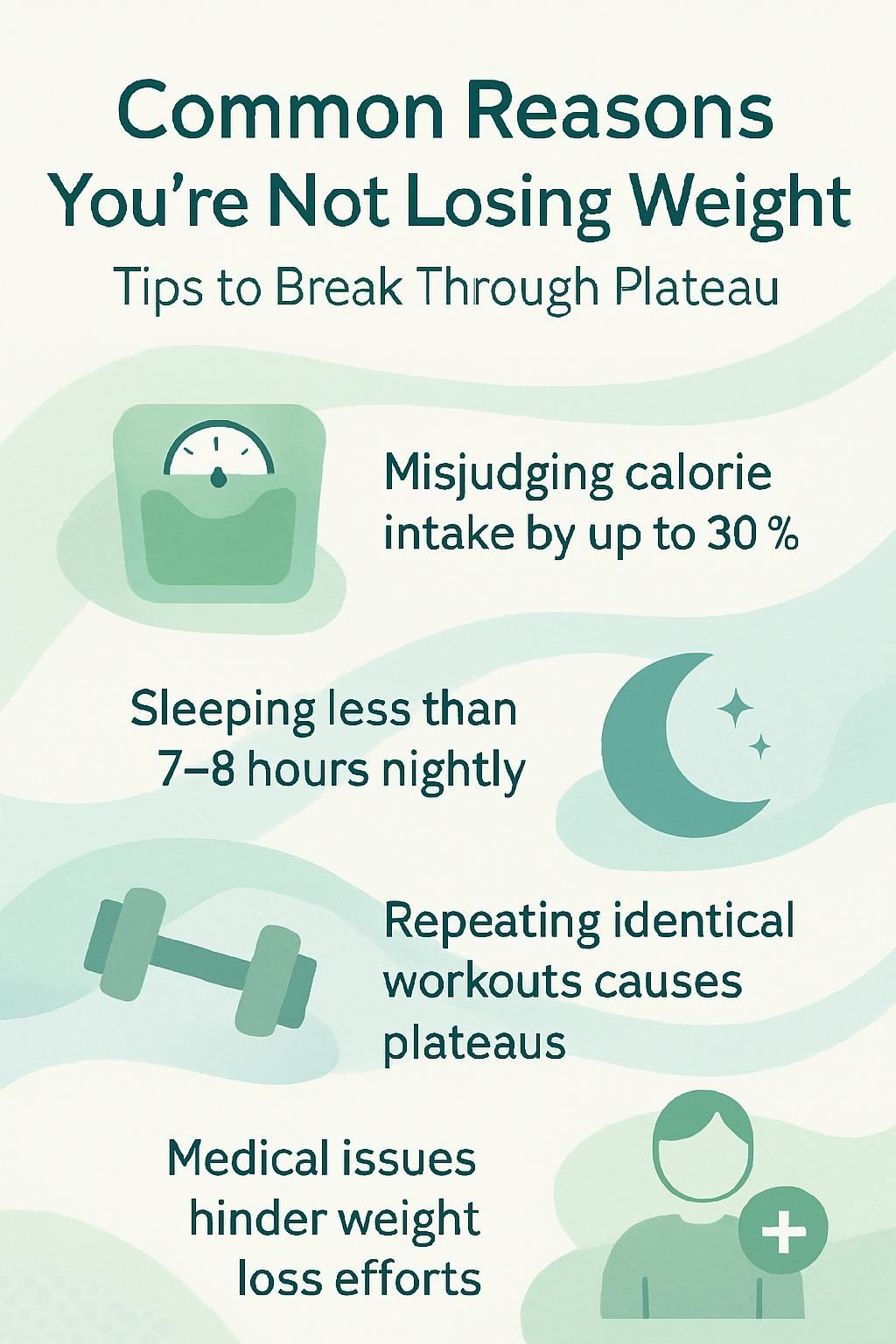Common Reasons You’re Not Losing Weight: Tips To Break Through Plateau
Our Nutrition Assistant AI Suite will transform your body. You will lose fat, get toned, and build muscle. Gain confidence and optimal health.
Working hard but not losing weight can feel discouraging. Small errors in calorie tracking or routine can block progress even when you try to lose weight with care. This guide explains common reasons you are not seeing weight loss, then gives simple steps to restart progress and break a plateau using safe, evidence-based habits.
You will learn how hidden calories, sleep, stress, and metabolism interact. You will also see how diet and exercise choices shape your daily energy balance. If you want real movement on the scale and in your waist, keep reading.
Key Takeaways
- Most people underestimate calories by up to 30 percent. Tracking intake and measuring portions helps close this gap.
- Whole foods rich in protein and fiber increase fullness and support weight management. Sugary or processed foods drive hunger and raise long-term disease risk.
- Less than 7 to 8 hours of sleep raises ghrelin, the hunger hormone, and cortisol, a stress hormone. Both increase appetite and slow metabolism.
- Cardio plus strength training increases muscle mass and daily calorie burn. Repeating the same workout or skipping recovery stalls results.
- Medical conditions and medicines, such as hypothyroidism, insulin resistance, PCOS, and some antidepressants, can hinder weight loss.

What Is a Weight Loss Plateau and Why Does It Happen?

A weight loss plateau happens when your weight stays the same even though you keep a healthy diet and exercise plan. Early loss is often faster. Many people drop several pounds in the first weeks because they shed water and glycogen, the body’s stored form of carbohydrate.
As you get lighter, your metabolism, your daily calorie burn, often falls. Losing slows to about 1 to 2 pounds per week for most people. Your muscles also adapt to repeated workouts and start using fewer calories for the same effort. Strength gains can hide fat loss on the scale since muscle is dense and takes up less space.
Plateaus are common. Seeing them as a normal part of weight management helps you focus on habits you can control, not just the number on the scale. Adjusting food quality, portions, and training variety usually restarts progress.
What Are Common Reasons You’re Not Losing Weight?
Several factors can make it hard to hit your weight loss goals. Knowing which ones apply to you helps you choose the next best step.
Am I Eating More Calories Than I Burn?
Calorie intake often creeps higher than you think. Research shows people misjudge intake by large margins, which can erase a planned calorie deficit. If you eat more calories than you burn, weight loss will stall or reverse.
Keep a simple food log or use photos to capture meals, snacks, and drinks. Drinks with sugar, creamy coffee, cooking oils, and large portions add up fast. Eating quickly or during distractions also pushes intake higher with less satisfaction.
Mindful eating, which means slowing down and checking hunger and fullness, helps ghrelin levels fall during a meal. Two weeks of tracking is usually enough to spot patterns and reveal high-calorie choices that seem small on the plate but big in total energy.
How Can I Better Estimate Portion Sizes?
Portion awareness is a powerful weight loss strategy. You control intake with simpler, more accurate serving sizes.
- Use measuring cups and a food scale for rice, pasta, nuts, cheese, and proteins.
- Compare to objects: a deck of cards for meat, a baseball for one cup, a golf ball for two tablespoons.
- Check plate size. Bigger plates encourage bigger servings.
- Read labels for serving size and calories per serving. Many packages contain two or more servings.
- Take photos of meals to review typical amounts over a week.
- Track intake in a journal or app. Consistent logging correlates with greater weight loss in studies.
- Measure waist size and, if possible, body fat monthly. These show fat loss even if the scale pauses.
- Stop at comfortable fullness. You do not need to clear the plate.
- Avoid eating straight from large containers, which masks the true amount.
- If you have disordered eating or are recovering, skip tracking unless guided by a registered dietitian or clinician.
Small measuring habits can save hundreds of calories per day without changing what you like to eat.
Why Should I Avoid Processed and Sugary Foods?
After dialing in portions, look at food quality. Processed foods and added sugars push blood sugar up, then down. That swing increases hunger and makes appetite harder to manage.
Packaged snacks, candy, white bread, and sweetened “health” drinks are common offenders. Whole foods like vegetables, fruit, beans, eggs, yogurt, poultry, and fish are more filling per calorie and support steady energy.
High intake of sugary drinks is linked with weight gain, type 2 diabetes, and heart disease risk in large reviews. Swapping soda and juice for water or unsweetened tea is a fast win. Read labels, since added sugars hide under many names. Some low-fat products replace fat with sugar to keep taste.
Choosing mostly whole foods helps you feel satisfied on fewer calories, which supports modest, steady weight loss and better health over time.
Are Caloric Beverages Affecting My Weight Loss?
Liquid calories slide past fullness signals. Soda, juice, sweet tea, and creamy coffee can add hundreds of calories per day without much hunger relief.
Artificially sweetened drinks may still drive appetite by affecting ghrelin. Even fizzy water can increase swallow air and feelings that mimic hunger for some people. Water is the simplest switch. Infuse it with citrus, berries, or mint for taste without sugar.
A meta-analysis found that replacing caloric drinks with water is linked to about a 5 percent reduction in body weight over time. This change is one of the easiest ways to support weight loss success.
Am I Getting Enough Protein and Fiber?
Low protein intake can stall progress. Protein increases fullness and helps preserve muscle mass during calorie restriction. More muscle means a slightly higher resting metabolic rate, your baseline calorie burn.
Aim for 20 to 30 grams of protein per meal. Good sources include poultry, fish, eggs, Greek yogurt, cottage cheese, tofu, tempeh, and beans. Fiber from beans, whole grains, vegetables, nuts, and fruit slows digestion and keeps you full longer.
Higher protein and fiber intake reduces hunger and helps prevent regain after weight loss in clinical studies. This combination also supports heart health and blood sugar control.
How Does Skipping Meals Impact Weight Loss?
Skipping meals often leads to stronger hunger later, which can trigger overeating or binge episodes. Frequent small meals do not boost metabolism, but regular eating patterns can make appetite easier to manage.
Intermittent fasting, planned periods without food such as 14 to 18 hours, can work for some people. It still depends on a calorie deficit and food quality. If skipping meals leads to evening overeating, switch to 3 meals and 1 to 2 planned snacks. Keep meals protein focused with produce, then add healthy carbs and fats.
How Does Metabolism Affect Weight Loss?
Your metabolism is the engine that burns calories all day. You can support it with smart training, enough protein, quality sleep, and stress control.
What Causes a Slow Metabolism?
Several factors can lower your metabolic rate. Hypothyroidism, an underactive thyroid, slows many body processes and increases fatigue. Some medicines, such as certain antidepressants and beta blockers, can reduce calorie burn or increase appetite.
Insulin resistance means your cells respond poorly to insulin, the hormone that moves sugar from blood into cells. This promotes fat storage. Poor sleep, high stress, aging with muscle loss, very low activity, and extreme dieting can also reduce daily energy expenditure.
If loss has stalled for months despite consistent habits, talk with your clinician to check for medical reasons and medication effects.
Am I Getting Enough Physical Activity?
Adults should aim for at least 150 minutes per week of moderate aerobic exercise like brisk walking, cycling, or swimming. Seventy-five minutes of vigorous exercise like running works too. Doubling this to 300 minutes improves fitness and helps weight management.
Regular activity improves insulin sensitivity and helps prevent regain. Step counts reveal hidden inactivity. Many people notice plateaus on weeks under 6,000 steps per day. Spread movement across the week for better results.
Why Is Strength Training Important for Weight Loss?
Strength training builds muscle mass. Muscle uses more energy than fat at rest, so gaining or maintaining muscle supports fat loss over time.
Research shows that combining strength work with cardio reduces body fat better than cardio alone. Two to three sessions per week that train all major muscle groups are enough for most people. Use progressive overload, which means gradually increasing weight, reps, or sets.
How Do Lifestyle Habits Influence Weight Loss?
Daily habits shape appetite, metabolism, and motivation. Sleep, stress, and alcohol are silent drivers of weight loss results.
Can Poor Sleep Affect My Weight Loss?
Poor sleep is linked to higher obesity risk in adults and teens. Most adults need 7 to 8 hours per night. Teens need 8 to 10 hours. Young children need even more.
Short sleep raises ghrelin, which boosts hunger, and lowers leptin, a fullness signal. Tired brains prefer quick energy foods, which increases intake of sugar and fat. Poor sleep also reduces calorie burn at rest and makes workouts feel harder.
A regular bedtime, a dark cool room, and less late-night screen time improve sleep quality. Better sleep helps your plan work without extra willpower.
How Does Stress Lead to Emotional Eating?
Stress raises cortisol, a hormone that increases appetite and favors belly fat storage. Under stress, people crave fast comfort foods and eat more, especially at night.
Set quick stress checks during the day. Five slow breaths before meals or a 10-minute walk can lower tension and curb urges to snack. If stress eating is frequent, short sessions with a counselor or therapist can help you build new coping skills.
Is Alcohol Consumption Hindering My Progress?
Alcohol contains about 7 calories per gram. A single cocktail can match a small meal in calories with little nutrition. Alcohol also lowers restraint and increases appetite, which leads to larger portions and extra snacks.
Cutting back helps many people make steady progress. It also supports blood sugar control for those with diabetes. Try drink-free weekdays, smaller pours, or lower-alcohol options. Track drinks like food so the calories do not go unnoticed.
What Hormonal or Medical Issues Can Affect Weight Loss?
Sometimes health conditions or medicines slow fat loss. A short medical review can uncover barriers that lifestyle changes alone cannot fix.
How Does Thyroid Function Impact Weight?
The thyroid helps control your metabolic rate, your baseline calorie burn. With hypothyroidism, the gland is underactive. Fatigue, feeling cold, and stubborn weight gain are common signs.
Blood tests can confirm the diagnosis. Treating low thyroid levels often improves energy and supports weight loss. If your weight does not change despite a consistent plan, ask your doctor to test thyroid function.
What Role Do Insulin Resistance and PCOS Play?
Insulin resistance means your body needs more insulin to move sugar from blood to cells. High insulin pushes the body to store fat, which makes weight loss harder at the same calorie intake.
PCOS, polycystic ovary syndrome, is a hormone condition that can increase insulin resistance, raise appetite, and change fat distribution. Many women with PCOS find weight loss slower, but not impossible. Regular exercise, higher protein, more fiber, and steady sleep help. Some people also benefit from medical treatment. Consult your clinician.
Can Medications Cause Weight Gain?
Several medicines can increase appetite or decrease calorie burn. Common examples include corticosteroids, some antidepressants, antipsychotics, birth control methods, and beta blockers.
If your weight rose after starting a medication, ask your healthcare provider about options. Sometimes a different dose or an alternative medicine can reduce this effect.
What Exercise-Related Barriers Could Be Stalling My Progress?
Workouts can help or hurt progress depending on variety and recovery. Small changes to your plan can restore calorie burn and motivation.
Why Is It Problematic to Stick to the Same Workout?
Your body adapts to repeated routines. The same workout burns fewer calories after a few weeks because you become efficient. Progress slows even if effort feels the same.
Rotate exercises every 4 to 6 weeks or add high-intensity interval training, called HIIT. HIIT uses short bursts of hard work with brief rest. This format challenges your heart and muscles in new ways and can break a plateau.
Can Overtraining or Poor Recovery Affect Results?
Too much training with too little rest raises cortisol and fatigue. High stress and poor recovery can reduce your metabolic rate and increase appetite. That makes it harder to stick to your plan.
Schedule at least 1 to 2 rest days per week. Sleep 7 to 8 hours. Eat enough protein and carbs to support training. If motivation drops, joints ache, or your sleep worsens, take a lighter week to reset.
Why Can’t Exercise Alone Lead to Weight Loss?
Exercise is great for health and mood, but it cannot overcome a high calorie intake. Many people eat back what they burn without noticing, especially with drinks and snacks.
Pair regular activity with portion control and food quality. Track intake for a week alongside workouts to see the full picture. The combination of diet and exercise is the most reliable path to fat loss in reviews from respected journals.
How Do Psychological and Behavioral Factors Affect Weight Loss?
Your mindset and daily systems shape consistent action. Clear goals and steady routines make change stick, even on stressful days.
Are My Weight Loss Expectations Realistic?
Fast early losses often slow to 1 to 2 pounds per week. Extreme weekly losses are not typical or safe for most people. Set goals you can maintain and measure, such as logging meals five days per week or walking 8,000 steps daily.
Track health markers like waist size, energy, and sleep. These outcomes improve before big changes appear on the scale and they matter for long-term health.
How Important Is Consistency in Habits?
Consistency beats intensity. A simple plan you follow most days works better than a perfect plan you quit. Use habits that fit your schedule and repeat well.
Ideas that help: plan protein at each meal, keep a food diary, prep produce on weekends, and set a bedtime. If the scale stalls, review your log. Small course corrections are easier when you have data.
Can Mental Health Challenges Impact Weight Loss?
Anxiety, depression, and chronic stress can drive emotional eating and increase calories. If you notice frequent overeating when your mood dips, address mood first.
Brief counseling, support groups, or digital programs can help build coping skills. Treating mental health is part of treating weight. It makes consistent action feel possible again.
What Are Effective Tips to Break Through a Weight Loss Plateau?
Plateaus respond to clear data, smart training, better food quality, hydration, stress care, and enough sleep. Pick one or two actions and apply them for two weeks.
How Can Tracking Calories Help Me?
Tracking gives you a factual picture of intake. Studies link consistent tracking with more weight loss. Log for 7 to 14 days to find hidden calories and portion creep.
Include oils, sauces, creamers, and beverages. Note alcohol. Weigh a few common foods once, such as peanut butter, cereal, and pasta, to reset your eye for portions. People who log regularly often reduce intake without feeling deprived.
If you have an eating disorder, avoid tracking and seek professional guidance for a safer approach.
Why Should I Add Strength Training and HIIT?
Strength work builds muscle, which supports a higher daily calorie burn. HIIT increases calorie use during and after a workout through excess post-exercise oxygen use, often called afterburn.
Blend two or three strength sessions with one or two HIIT sessions per week. Keep one or two easy cardio days for recovery. Variety prevents adaptation and keeps workouts engaging.
What Are the Benefits of Whole, Nutrient-Dense Foods?
Whole, nutrient-dense foods provide protein, fiber, vitamins, and minerals with fewer empty calories. They keep you full longer and make a calorie deficit easier to maintain.
- Lean proteins: chicken, turkey, fish, eggs, tofu, beans.
- High-fiber carbs: oats, quinoa, brown rice, beans, lentils, fruit.
- Non-starchy vegetables: greens, broccoli, peppers, carrots, tomatoes.
- Healthy fats: olive oil, avocado, nuts, seeds, in modest portions.
Read ingredient lists. Shorter lists usually mean less processing. Swap sugary breakfast cereal for oatmeal with berries. The steadier energy reduces mid-morning snacking.
How Does Staying Hydrated and Reducing Alcohol Help?
Replacing sugary drinks with water supports weight loss in clinical reviews. Drinking water before meals can help you eat fewer calories and may slightly raise calorie burn for a short time.
Alcohol adds calories and weakens food restraint. Reducing alcohol often improves sleep quality and appetite control, both of which support weight loss.
Here is a quick summary of simple actions that support weight loss:
| Action | Impact |
|---|---|
| Replace sugary drinks with water | Average weight loss around 5 percent over time, based on meta-analyses |
| Drink water before meals | Lower meal calories and slightly higher short-term metabolism in trials |
| Limit alcohol | Fewer liquid calories and better appetite control |
What Stress Management Techniques Work Best?
Stress care reduces cortisol and cravings. Try one of these daily tools:
- Box breathing: inhale 4 seconds, hold 4, exhale 4, hold 4, repeat 2 minutes.
- 10-minute walks after meals to lower stress and aid blood sugar control.
- Journaling two lines about what went well today to shift attention to wins.
- Short guided meditations or prayer before bed for calmer sleep.
If stress feels unmanageable, speak with a mental health professional. Treating stress makes healthy eating easier to sustain.
How Can Better Sleep Improve Weight Loss?
Quality sleep balances ghrelin and leptin, your hunger and fullness hormones. Adults aiming for 7 to 8 hours tend to make better food choices and complete more workouts.
Build a sleep routine: consistent bed and wake times, a cool dark room, no caffeine after mid-afternoon, and a 30-minute wind-down. Good sleep supports metabolism and appetite control, which helps a plateau move again.
When Should I Seek Professional Help for Weight Loss?
If you have tracked carefully, trained regularly, and improved sleep and stress, yet your weight has not changed for 8 to 12 weeks, outside help can move you forward safely.
Why Consult a Registered Dietitian?
Registered dietitians provide individualized nutrition plans that match your preferences, schedule, and medical needs. They teach portion skills, help you set targets for protein and fiber, and troubleshoot plateaus using your food log.
Working with a dietitian is linked with better long-term results in clinical settings. It also supports people with conditions like insulin resistance, PCOS, or high cholesterol.
When Should I Talk to My Doctor About Medical Issues?
Talk with your doctor if you suspect hypothyroidism, PCOS, insulin resistance, sleep apnea, or medication side effects. Lab tests and medication reviews can reveal why weight loss is slow.
Your clinician may adjust a prescription or recommend treatment for an underlying issue. Early care prevents complications and helps your weight loss plan work better. This article is educational, not a substitute for medical advice. Always consult your healthcare professional for diagnosis and treatment.
Conclusion
Breaking a weight loss plateau takes clear data and small targeted changes. Track calories for two weeks, improve food quality, and add strength training to protect muscle mass and metabolism. Reduce liquid calories, work on stress, and aim for 7 to 8 hours of sleep each night.
If progress stalls or you suspect a medical cause, seek help from a registered dietitian or your doctor. With steady habits and the right support, you can lose weight, protect your health, and maintain results over time.
FAQs
1. Why am I not losing weight even though I eat less and exercise more?
Many people reach a plateau because their metabolism slows as they lose body mass. Research from the National Institutes of Health shows that calorie needs decrease with weight loss, so your current intake may no longer create a deficit. Tracking food portions and adjusting activity levels can help restart progress.
2. How does sleep affect my ability to lose weight?
Studies published in the journal Obesity found that adults who slept fewer than six hours per night had higher rates of body fat retention compared to those who slept seven or more hours. Poor sleep disrupts hormones like leptin and ghrelin, which control hunger and fullness signals.
3. Can stress prevent me from losing weight?
High stress raises cortisol levels, which has been linked in clinical trials to increased abdominal fat storage and cravings for high-calorie foods. Managing stress through mindfulness or physical activity supports healthier eating habits and better results.
4. What are some evidence-based tips to break through a weight loss plateau?
Increase daily movement by adding short walks after meals; review your meal plan for hidden calories such as sauces or drinks; keep a food diary for accuracy; aim for at least 25 grams of protein per meal based on data from the American Journal of Clinical Nutrition; prioritize consistent sleep patterns each week.
Summary: Weight plateaus often result from metabolic changes, poor sleep, unmanaged stress, or unnoticed extra calories. Adjusting these factors using proven strategies can help you resume steady progress toward your goals.







